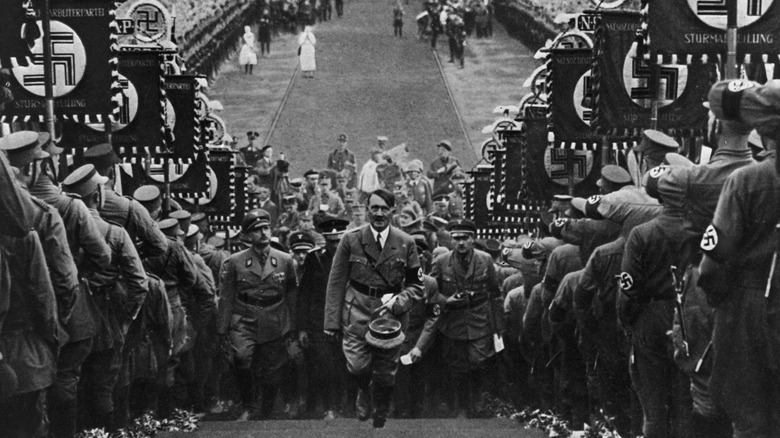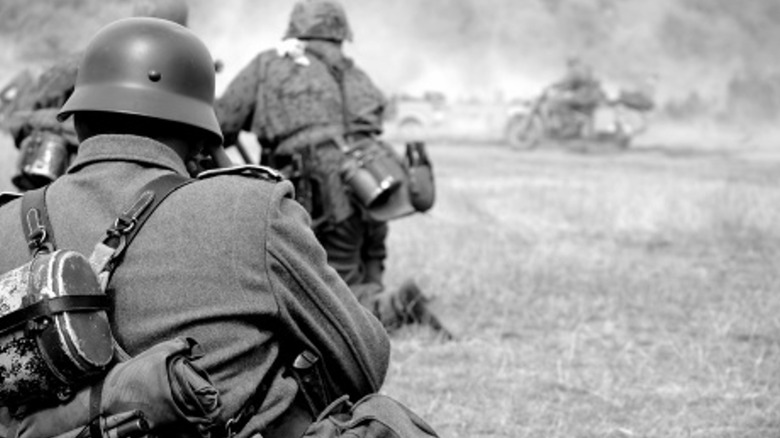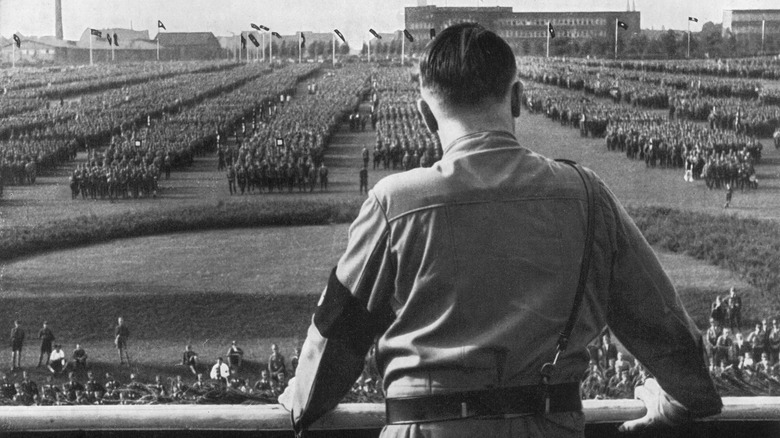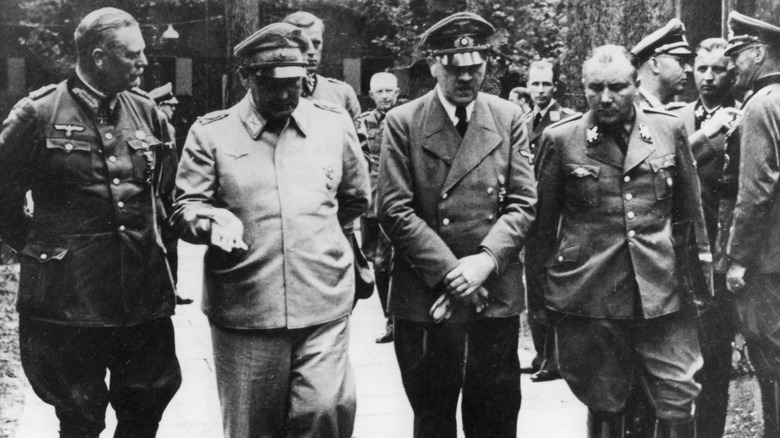Here's When Hitler Knew He Would Lose World War II
Nazi Germany stormed out of the gate at the onset of World War II in 1939. Fueled by Adolf Hitler's rhetoric and employing ultra-fast and hard Blitzkrieg — i.e., "lightning war" — tactics, Germany plowed through Norway, Denmark, Belgium, the Netherlands, Luxemburg, and France in a matter of months. At that point, early on in the war, it seemed like the German war machine was unstoppable. But bit by bit, as Germany expanded its efforts along multiple fronts and spread their forces thinner and thinner, and their troops, supplies, tanks, and planes penetrated further into occupied or enemy territory, it became clear that Germany was in trouble. In fact, hints were there as early as 1942, no matter that Germany didn't surrender until 1945.
Sites like We Are the Mighty describe how it was kind of always inevitable that Germany would lose, despite all the terror they inspired. They were surrounded in the middle of continental Europe on all sides, their natural resources were slim, and they relied on foreign powers like Romania and Russia for oil. And when Hitler turned on its ally Russia in December 1940 — seven months after it'd conquered France — Germany lost its main fuel source. From late 1942, even as Hitler underwent his second attempt at conquering Russia through Stalingrad, the Nazi strategy had already shifted from conquest to preservation. Arguably, Hitler saw the end coming even then. Within a year, Germany's entire command knew that they would lose.
Hitler overreached with Russia
While Nazi Germany lost World War II for a host of reasons, largely related to supplies and resources, it was Adolf Hitler's defeat in Russia that more or less sealed his nation's defeat. In December 1940, Hitler launched Operation Barbarossa to invade Russia. He promised victory in 10 weeks, saying, "We have only to kick in the front door and the whole rotten edifice will come tumbling down," per the Imperial War Museum. Almost two years later in September 1942, after Operation Barbarossa failed, he made a similar boast during the Battle of Stalingrad, saying, "The Russians are finished. In four weeks they will collapse," per the Global Village Square. In both cases he was wrong.
Essentially, Germany's invasions of Russia drained resources that could have been spent elsewhere. Operation Barbarossa (June 22 to December 5, 1941) was the largest single military campaign in history, consisting of 3 million soldiers, 3,000 tanks, 2,500 aircraft, and 7,000 artillery pieces. They pushed all the way to 12 miles within Moscow but failed due to a combination of Russian weather, the large and difficult terrain, the resolve of its soldiers, and more. Later when Germany tried and failed to take Stalingrad (July 17, 1942 to February 2, 1943) it expended another 1.2 million soldiers.
Meanwhile, all was quiet on the western front. But by 1942, the United States had joined the war and was cooking up a plan with Britain to break German lines in the west. Germany had too many points to monitor, and Hitler knew it.
Hitler knew he would lose by late 1942
Without a direct statement from Adolf Hitler along the lines of, "Now I know we're going to lose," it's a little difficult to suss out precisely when he realized Germany was facing defeat. After all, Hitler was all about public bluster and appearance. And yet as early as the summer of 1942, Hitler could see the path that would lead to German failure. As Global Village Space quotes him at the time, this path centered on Russia. "If we do not capture the oil supplies of the Caucasus by the autumn," he said, "then I shall have to face the fact that we cannot win this war." Again, remember that Hitler brought this lack of oil on himself by turning on his ally.
It seems Hitler's fears of defeat turned into belief by November that year. The German assault on Stalingrad was still underway, and not only was it taking way longer than expected, but all reports indicated that Germany would lose. The Soviet army wouldn't abandon their city and they kept pushing back. Soviet tanks outmatched German tanks, many of which were inferior, repurposed tanks obtained from other Axis powers. Russian winter was also settling in, much like it had done during Operation Barbarossa.
Nazi Minister of Armaments, Albert Speer, visited Hitler around this time. As Global Village Space quotes, he described Hitler as, "an old man, a man who was really already defeated." Struck by the "dawning recognition that the war was already lost."
The failed Hitler assassination attempt
If Adolf Hitler foresaw Germany's defeat near the end of 1942 during the Battle of Stalingrad, we can be pretty sure that some of his advisors and officials did, too. By the following year in 1943, it seems like most of the Nazi leadership sensed the same. But rather than accept defeat, Hitler pressed all the way until his own suicide on April 30, 1945. And before then he survived an often-overlooked, failed assassination attempt in July 1944 dubbed by Operation Valkyrie.
As the United States Holocaust Memorial Museum explains, Operation Valkyrie resulted from the same "increasingly irrational management of the war" that drove Hitler to do things like invade Russia twice. Germany was going to lose, and eventually, everyone knew it. In an attempt to save what was left of their country, some of Hitler's military advisors turned on him along with former Nazis who resigned in the 1930s because they'd disagreed with the direction Hitler was taking their country.
The plan was surprisingly simple. One conspirator, Colonel Claus von Stauffenberg, would carry a briefcase containing two bombs into Hitler's headquarters, aka the "Wolf's Lair." After the bombs went off, the conspirators would depose Nazi leaders in key locations and immediately set about negotiating an end to the war. Unfortunately, the bombing failed and Hitler survived. Then, he went on a rampage and executed nearly 5,000 people. But no matter all these deaths and all the foresight that preceded them, the war wouldn't end until Germany surrendered on May 7.



